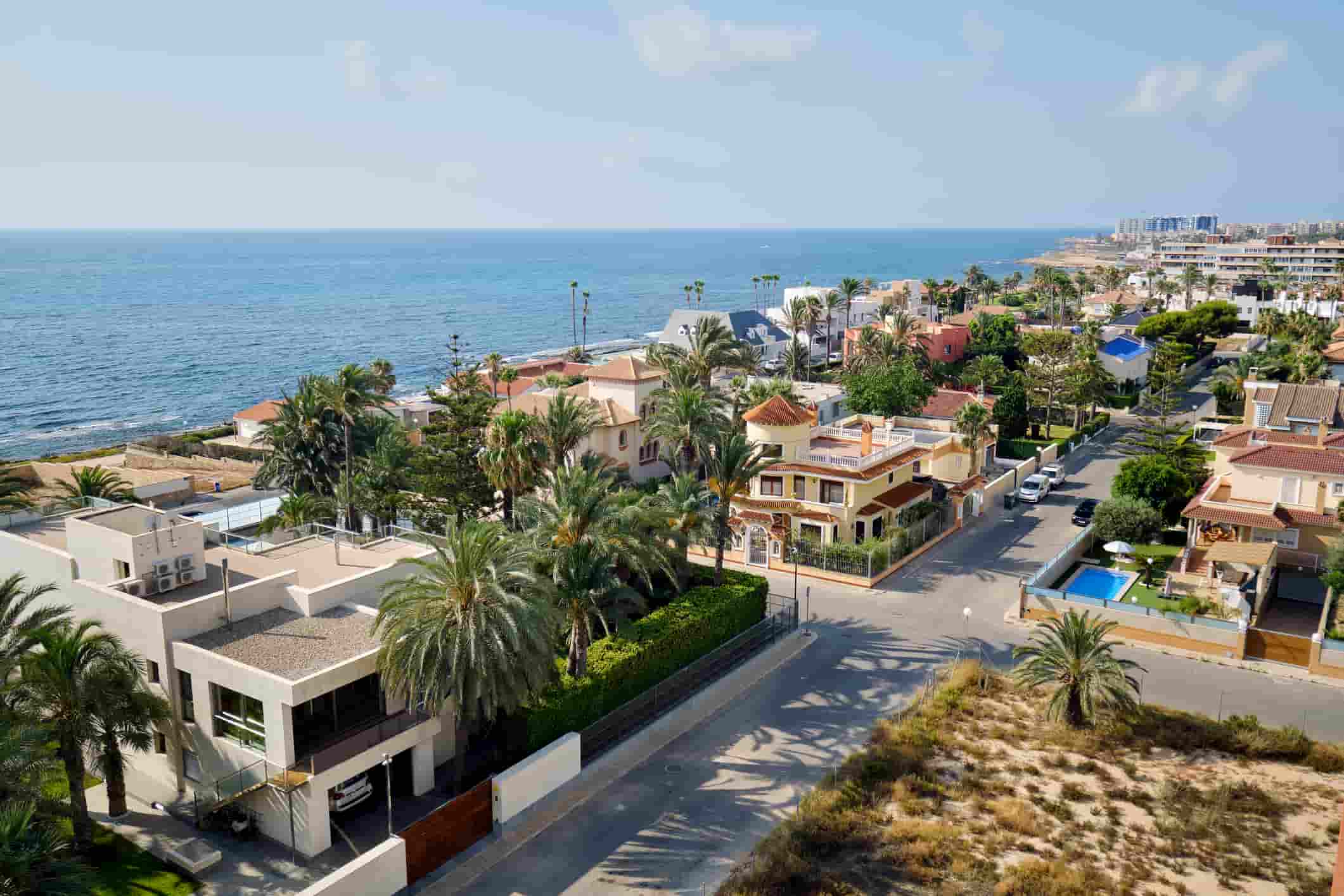Last Updated on June 9, 2025
Are you a UK landlord planning to or are already renting abroad?
Renting property abroad can be a great opportunity for UK landlords seeking additional, steady income.
However, there is much to learn about the complex subject of renting property abroad.
In this article we’ll cover:
- The ins and outs of letting property abroad in Europe
- What do I need to know when I rent out property abroad?
- Tax implications after Brexit
- What taxes does a UK resident need to pay when renting out a property in France?
- Paying tax on rental property in Spain
- How do I avoid double taxation?
- Who can help me file my rental income tax return?
- Why is Property Tax International better than a local accountant?
Should I rent my property abroad?
If you are a UK landlord and plan to rent property abroad, it can be a great way to have an additional, steady income.
While it can be an attractive option, it has its advantages and disadvantages. You will need to consider a couple of factors such as understanding the local rental market, legal requirements, and tax implications.
Each country has its own set of legal and tax requirements for landlords, which can be complex and time-consuming to get to grips with.
That’s why it can be helpful to hire a letting agency to manage your property.
Ultimately, renting property abroad depends on how you can manage these factors effectively.
If you are comfortable with the complexities and are prepared to invest the necessary time and resources, renting your property abroad can be rewarding.
What do I need to know when I rent out property abroad?
Choose how much you want to be involved
When renting out a property abroad, you will need to decide how much involvement you will have in the management process.
You can be involved throughout the entire process, handle the day-to-day tasks like, screening tenants, collecting rent, maintenance, handling tenant communications and ensuring legal compliance.
Consider a property management company
As you can imagine, being involved throughout the entire process of letting property abroad can be time-consuming.
This is why many landlords choose to hire a management company to help manage the property.
However, it’s important to consider your personal circumstances and determine which option aligns best.
Create a website for your property
Creating a website for your rental property abroad can significantly enhance your business, particularly if you’re advertising your rental for people on holidays.
Creating a website is a good idea because you can showcase high-quality photos of the accommodation, provide virtual tours, and essential information such as rental rates, availability, and local attractions.
Through a website, prospective tenants can also easily access information on the accommodation and may even be able to book directly online.
Depending on the purpose of your property, an online website can be a great option.
Register your property on booking sites
Whether you are planning on letting your property for holidaymakers or for long-term rentals, registering your property on booking sites can be beneficial.
That’s because booking sites offer extensive reach and visibility, increasing the likelihood of finding reliable tenants.
Registering online also helps to manage bookings, receive secure payments, and also simplifies the rental process.
Additionally, on booking sites often there are features like guest reviews and ratings, which can build trust and credibility, making your property more appealing.
By registering on these platforms as a UK landlord, you can effectively market your overseas properties.
Some booking sites you can consider depending on whether you are letting your property short-term or long-term include Booking.com or Idealista.

booking website for property
Advertise online
As a UK landlord with properties abroad, advertising your property online is a good idea for several reasons.
Online platforms have large audiences, meaning you could find tenants from around the world.
Advertising online can also be a cost-effective way to market your property.
Online advertising can then also be a great way to showcase high-quality photos, videos, and virtual tours of your property, giving prospective tenants a clear understanding of what to expect.
Overall, advertising your property online is a great way to effectively market your overseas property.
What platform should I use?
A social media platform you can consider advertising on includes Facebook, such as Facebook marketplace, groups and ads.
Additionally, Instagram may also work well as you can add posts and stories of high-quality photos and useful information about your property.
There are of course many other platforms you can consider such as Youtube, Pinterest, etc.
Read more:
Uk landlord tax – File property tax return online
Create a welcome pack for your guests
Having an arrival guide and welcome pack for guests/ tenants is quite important for several reasons, including it:
- Enhances the experience for the guests/tenants ensuring it’s a smooth arrival
- Provides the guest/tenant with essential details about the property, local amenities, and emergency contacts
- Shows professionalism, which can distinguish your property from others in the market
What to include in a guide/welcome pack?
For both long-term and short-term rentals, a well-thought-out welcome pack and guide can greatly enhance the guest or tenant experience.
You can include some of the following:
- Welcome letter – A friendly note expressing your pleasure in hosting them
- Basic supplies – Essentials such as toiletries and possibly some coffee, tea, or snacks
- Emergency information – contact details for local emergency services, medical facilities, and the nearest pharmacy
- Guide to local attractions – Including restaurants, cafes, landmarks, entertainment venues, and places to shop
- Public transport information – Timetables and routes for local buses, trains, etc
- Contact information – Your contact details or those of a local property manager
- Arrival guide – This is if it’s a short-term rental/ rental for holidaymakers, you can include instructions on checking in and out
- Property instructions – Including how to operate appliances, heating/cooling systems, Wi-Fi, and any other property features
- House rules – Guidelines on behavior expectations, such as noise levels, smoking policies, pet rules, etc.
- Safety information – Instructions for using safety equipment like smoke detectors, fire extinguishers, and first aid kits
- Emergency procedures – Steps to follow in case of emergency situations, including evacuation routes and procedures
If you are letting your property overseas long-term, you should also consider providing a summary of your lease agreement.
Our property tax advisors can help you file your rental income tax return if you are renting property in France, Spain, Germany, US, Ireland, Hungary, Poland and UK.

Renting abroad – Spanish property
Furniture – why is it so important
Whether you need to include furniture in your overseas rental property as a UK landlord depends on several factors, including the type of rental, target market, and local rental norms.
Short-term rentals are generally fully furnished. Guests usually prefer well-furnished properties that offer the convenience of home, including essentials like beds, sofas, dining tables, and kitchen appliances.
For holidaymakers, students and business professionals, furnished rentals are ideal as they are only there for short periods.
Long-term rentals on the other hand can be furnished or unfurnished. Local tenants may have different expectations, so it’s important to check with the local expectations.
You can also offer flexibility for long-term rentals offering both a furnished or unfurnished option. By doing this you can cater to a broader range of tenants.
It’s important to note that if you decide to furnish your property, you will need to maintain it in the future and take care of replacement costs.
Insurance
In many countries, it is legally required to have insurance when renting a property.
However, you should note that home insurance does not typically cover rentals.
If you are planning to rent out your property on a regular basis you can obtain landlord coverage.
Landlord coverage usually covers damage to the premises, certain personal property like appliances and lawn care equipment, and liability issues.
It’s important that you understand the specific insurance requirements of the country where your property is located as regulations can vary.
Even if insurance is not legally required, you may consider opting for it as having insurance helps manage financial risks associated with your rental property.
Deposit
Whether your property is a short-term or a long-term rental, acquiring a deposit is a good idea.
As a landlord, a deposit ensures that your property is protected if there is damage to the property and it also covers you if there are cancellations on short-term properties.
The deposit amount required from the tenant/guest will depend on the country your property is rented in.
It’s important that you keep detailed records of all transactions related to the deposit, including receipts.
Security
Whether you are renting your property short-term or long-term, security is an important consideration to protect both your property and provide a safe environment for guests/tenants.
Some security options you can consider include:
- High-quality durable locks for doors and windows
- Burglar alarm systems
- CCTV
Cleaning and maintenance
As a UK landlord letting property abroad, it’s important to maintain a high standard of cleaning and maintenance, whether that’s for long-term or short-term rentals.
If you are renting to long-term tenants, you are generally not responsible for regular cleaning of the property during the tenancy.
However, as the landlord, you should ensure that the property is thoroughly cleaned before the new tenant/ guest moves in for both short-term and long-term rentals.
Naturally, for short-term rentals, frequent turnovers mean that there will be more frequent cleaning.
Maintaining all your rentals is also an important responsibility you have as a landlord, ensuring that necessary repairs are carried out.
Paperwork
As a landlord you will most likely be dealing with a fair amount of paperwork, therefore, it’s key to make sure that you keep your paperwork safe.
That’s because you may need your paperwork for some of the following reasons:
- To ensure that you comply with property laws and regulations
- You need accurate records of income, expenses, taxes, and maintenance costs for financial management and tax purposes
- In any case that you need to resolve disputes with tenants, contractors, or local authorities
Here are some tips to keep your paperwork safe include:
- Keep physical copies in a secure, fireproof, and waterproof safe place
- Have digital copies for all important documents
- Regularly back up digital files to an external hard drive or another cloud service to prevent data loss
- Use secure methods for sharing sensitive documents, such as encrypted email services or secure file transfer
Legal and tax implications
Different countries have unique laws and regulations regarding property ownership, rental agreements, tenant rights, and taxation, that’s why it’s important as a UK landlord with properties overseas to ensure compliance and avoid legal issues.
You can of course manage these aspects yourself, however, it can also be a good idea to work with property management companies or legal advisors to ensure you are legally compliant and then a property tax advisor to ensure you manage your tax obligations.
Filing a rental income tax return
As a landlord, you need to pay tax on the rental income you earn from your property. The amount you pay will differ depending on the location of your property.
Part of being a landlord is filing a rental income tax return, ensuring that you declare the income you made from your property.
Tax responsibility and laws differ from country to country and understanding local tax regulations can be complex, hence why it can be a good idea to consult with tax professionals who specialize in international property like Property Tax International.
At Property Tax International we can help you to file your international property tax return easily online.
File your Property Tax Return Online
Tax implications after Brexit
As a UK landlord renting abroad, you are not considered part of the EU – this is one of the implications of Brexit.
As a result, in multiple countries in Europe, you will pay higher taxes on your rental.
Some countries you pay higher tax in as a UK landlord include Spain and France, for example instead of 19% income tax in Spain, you will pay 24%.
Whereas, in France, UK landlords face higher social charges on rental income and capital gains since Brexit. Before Brexit, UK residents, like other EU residents, were subject to a social surcharge of 7.5%. Post-Brexit, UK residents are subject to the full rate of social charges, which is 17.2%, similar to other non-EU residents.
However, in some countries, you will pay similar rates to EU landlords, such as Ireland, the USA, or Hungary.
What taxes does a UK resident need to pay when renting out a property in France?
When you are renting out a French property as a UK resident, you will be subject to income tax and social charges.
Income tax:
Firstly, you will be subject to income tax on rental income earned from French property.
Non-residents are subject to a minimum tax rate of 20% for up to €28,797 and 30% for income over that.
Social charges:
In addition to income tax, rental income may be subject to social charges. The rate is up to 17.2%.
Our tax advisors can help you file your rental income tax return in France and UK.
Got questions? You can request a free callback from a tax expert.
Paying tax on rental property in Spain
If you are a UK landlord with properties in Spain, you will have to declare your income in Spain alongside the UK.
You will need to pay both income tax and property tax for your Spanish property.
Income tax:
Your rental income will be subject to Spanish income tax.
Since Brexit, UK landlords are considered non-EU residents and are subject to a higher income tax rate of 24% on their gross rental income.
Note that unlike EU residents, non-EU landlords cannot deduct expenses related to the rental property.
Property tax:
This is an annual local tax calculated based on the property’s cadastral value.
The rates for this tax vary by municipality, and it must be paid to the local authorities where the property is located.
Our tax advisors can help you file your rental income tax return in Spain and UK.
Got questions? You can request a free callback from a tax expert.
How do I avoid double taxation?
There are a number of things you can do as a UK landlord with overseas properties to avoid double taxation.
The UK has Double Taxation Agreements with many countries, and these are designed to ensure that you are not taxed twice on the same income.
To avoid double taxation, it’s important to ensure you are registered with the tax authorities in the country where your property is located, declare your rental income, and pay the necessary taxes.
You also need to ensure that you declare all your foreign income in the UK on your UK Self-Assessment tax return.
When declaring your income on the UK Self-Assessment tax return, include the Foreign Tax Paid by doing the following:
- Report your foreign rental income on the Foreign pages (SA106) of your UK Self-Assessment tax return
- Enter the amount of foreign tax paid as a foreign tax credit in the relevant section of the SA106 form
It’s important that you keep detailed records of all tax returns and receipts for taxes paid in both the overseas country and the UK.
Given the complexities of international tax laws, consulting with a tax professional who has expertise in both UK and foreign tax matters can be a good idea. They can help you navigate the rules, ensure compliance, and maximize your tax relief.
File a UK Self-assessment Tax Return
Who can help me file my rental income tax return?
If you are a UK landlord renting property abroad, Property Tax International can help you file your rental income tax return ensuring full tax compliance.
We provide tax return services for property owners worldwide.
At Property Tax International you save time and stress with easy online filing.
Why is Property Tax International better than a local accountant?
At Property Tax International we guarantee:
- Better value – We provide a more affordable service compared to your local accountant
- Local knowledge – With offices worldwide, we have in-depth local knowledge to help you maximize your tax return
- Tax specialists – As experts in international property tax, we ensure accurate determination of your residency status and apply all eligible tax reliefs
- No language barrier – We communicate in our clients’ languages and liaise with local tax authorities, ensuring correct form submissions
Got questions? Request a free callback from a tax professional.




